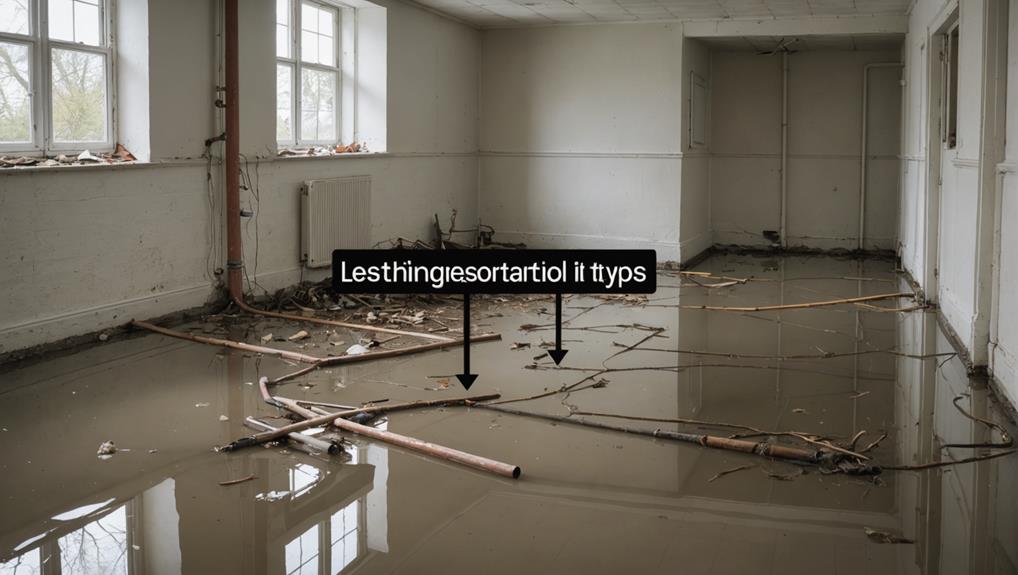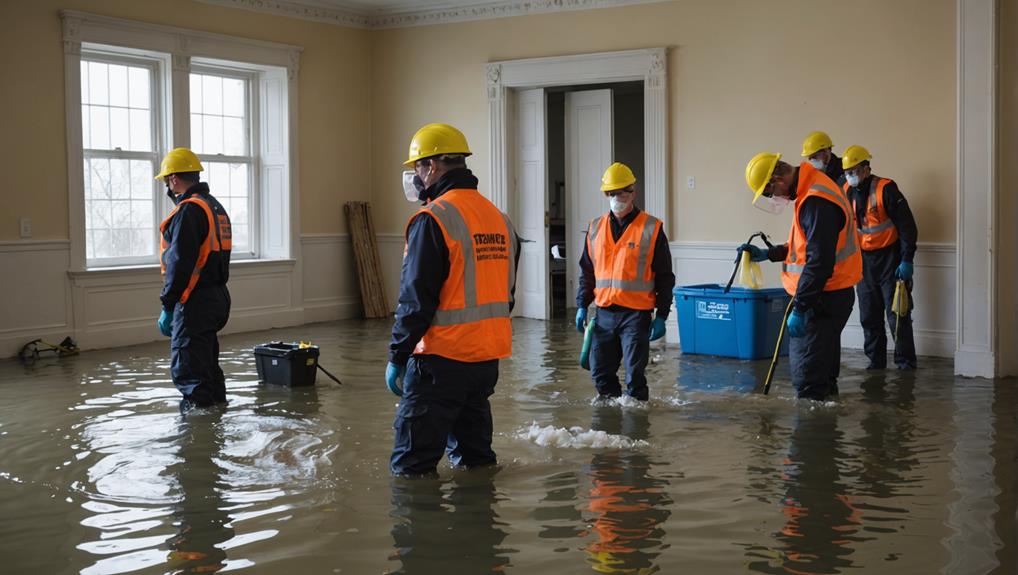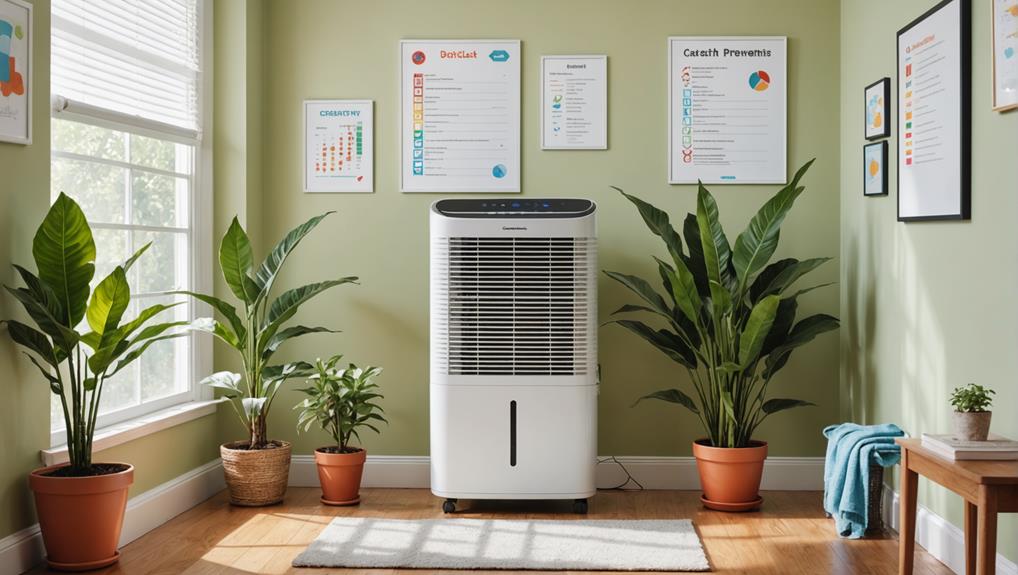Water damage myths can lead to costly mistakes, so it's important to know what really works. Quick action is necessary; remove standing water immediately to minimize harm. DIY solutions like using fans and dehumidifiers are effective, but remember, drying wet areas alone won't suffice. Always inspect for hidden moisture, especially if mold is a concern. Professional restoration services offer thorough evaluations and advanced techniques, especially for extensive damage. Finally, reviewing your insurance is significant, as many policies have exclusions. For insights on prevention and further strategies, you'll find valuable information to equip you for the future.
Common Water Damage Myths

When it comes to water damage, many misconceptions can lead to costly mistakes. One common myth is that all flood damage is covered by insurance. In reality, many policies have specific exclusions or require additional coverage for certain types of water damage. Understanding these insurance misconceptions is essential for effective emergency response.
Another prevalent belief is that you can handle cleanup procedures on your own without professional help. While DIY might seem tempting, improper moisture control can lead to long-term issues, like mold growth, which compromises your home's structural integrity. Relying solely on unverified repair myths can worsen the problem rather than fix it.
Many homeowners as well think that drying wet areas is sufficient for restoration. Nonetheless, effective restoration techniques involve more than just drying; they require thorough inspections and treatments to guarantee that hidden moisture is addressed. Ignoring these aspects can lead to hidden damage that's far worse than the initial flood damage.
You deserve to have accurate information when dealing with water issues. By dispelling these myths, you can make educated choices that protect your home and peace of mind.
DIY Solutions: What's Effective?
If you're facing water damage, you might be tempted to tackle the cleanup yourself, thinking it can save you time and money. While some DIY solutions can be effective, it's vital to know which homemade remedies and techniques truly work.
First, act quickly. Remove standing water with a wet/dry vacuum or towels, as every moment counts to prevent further damage. For damp areas, use fans and dehumidifiers to help with drying – these are among the most effective techniques to reduce moisture levels.
When it comes to cleaning surfaces, a mixture of vinegar and water can be an excellent homemade remedy for mold and mildew. Just remember to scrub thoroughly and make sure the area is well-ventilated. Baking soda is another great option; sprinkle it on affected areas to absorb odors and moisture.
However, be cautious. Certain techniques might not tackle the root of the problem. If the water damage is extensive or involves sewage, it's often safer to consult a professional. But for minor incidents, these DIY methods can help you reclaim your space without costing a fortune. Just remember, your safety is the top priority!
Professional Restoration Services

Turning to professional restoration services can be a smart move when water damage overwhelms your ability to manage it. These experts bring not only their knowledge but likewise the right tools and techniques to effectively handle the situation. When you face water damage, you'll want to ascertain you're getting the best help possible. Here's what you can expect from a professional service:
- Emergency response: They'll arrive quickly to assess and mitigate the damage.
- Advanced restoration techniques: Experts use specialized equipment for drying and dehumidifying.
- Comprehensive evaluation: They'll identify hidden moisture and potential hazards.
- Safety protocols: Professionals follow strict guidelines to keep everyone safe.
- Insurance guidance: They can help you understand what to expect regarding coverage.
Don't underestimate the complexity of water damage; it can lead to mold and structural issues if not handled properly. By opting for professionals, you're not just addressing immediate concerns but likewise protecting your home long-term. Their expertise provides peace of mind, allowing you to focus on recovery rather than worry.
Insurance Coverage Insights
Steering through insurance coverage for water damage can be overwhelming, but understanding your policy is vital for effective recovery. Start by reviewing your homeowners or renters insurance to see what's covered. Many policies include specific provisions for water damage, but the extent of coverage can vary markedly. Knowing your policy limits is fundamental; they define how much the insurer will pay for repairs, and any damages exceeding these limits may come out of your pocket.
When you experience water damage, it's important to initiate the claims process promptly. Document the damage with photos and gather any relevant information, as this can help expedite your claim. Be prepared to provide your insurer with details about the cause of the damage, as some types, like flooding, may require separate flood insurance.
Don't hesitate to ask questions if you're unclear about any part of your coverage. Understanding these aspects can not only reduce stress but also guarantee you're fully prepared for whatever comes your way. In the end, being informed about your insurance helps you navigate this challenging time with more confidence and peace of mind.
Mold Prevention Techniques

To effectively prevent mold growth in your home, maintaining a dry environment is key. You'll want to keep humidity levels in check, ideally below 60%. Here are some practical techniques you can implement to achieve that:
- Use Dehumidifiers: Place them in damp areas like basements or bathrooms to help absorb excess moisture.
- Ensure Proper Ventilation: Open windows, use exhaust fans, and keep air circulating to prevent stagnant air that promotes mold.
- Seal Leaks Promptly: If you notice any leaks from pipes or roofs, fix them as soon as possible to prevent moisture accumulation.
- Store Items Properly: Avoid storing items in damp areas. Use airtight containers for seasonal items to keep moisture at bay.
- Regularly Check Appliances: Make sure your washing machine, dishwasher, and refrigerator aren't leaking, as these can be hidden sources of moisture.
Long-term Damage Effects
How can water damage affect your home in the long run? The effects can be profound and often go unnoticed at first. When water infiltrates your home, it doesn't just create an immediate mess; it can compromise your home's structural integrity over time. Wood beams can weaken, drywall can crumble, and foundations can shift, leading to costly repairs down the line.
Hidden damages often lurk behind the scenes, making them hard to detect until it's too late. Insulation can become saturated, nurturing an environment for mold and mildew, which can spread quickly. You might think you've dried everything out, but moisture can remain trapped in walls and floors, causing rot and decay that can undermine your home's stability.
Moreover, the longer you wait to address water damage, the more extensive and expensive the repairs can become. It's vital to act promptly and thoroughly to mitigate these long-term effects. Understanding these risks can help you take the necessary steps to protect your home, ensuring it remains a safe haven for you and your family for years to come.
Tips for Future Prevention

To prevent future water damage, you need to prioritize regular maintenance checks around your home. Make certain that your drainage systems are functioning properly to direct water away from your foundation. By taking these proactive steps, you can greatly reduce the risk of costly repairs down the line.
Regular Maintenance Checks
While you might think your home is safe from water damage, regular maintenance checks are crucial for preventing unexpected issues. Implementing routine inspections and seasonal checks can save you from costly repairs down the line. It's more than just a good idea; it's a necessity for preserving your home's integrity. Here are some practical tips to keep in mind:
- Inspect your roof for missing shingles or signs of wear.
- Check gutters and downspouts to verify they're clear of debris.
- Examine windows and doors for any signs of leaks or damaged seals.
- Look for signs of moisture in your basement or crawl spaces.
- Test your sump pump to confirm it's working effectively.
Proper Drainage Solutions
After confirming your home is well-maintained, it's time to focus on proper drainage solutions to prevent future water damage. A well-designed drainage system is essential for managing water flow away from your foundation. Start by inspecting your gutters; clean them regularly and verify downspouts direct water at least five feet away from your home. This simple step can make a huge difference.
Next, consider grading your yard. The ground should slope away from your foundation to encourage water to flow in the right direction. If your yard is flat, you might need to build a swale or install a French drain to redirect excess water.
Don't forget about landscaping. Use plants that absorb water efficiently, and avoid placing mulch too close to your foundation, as it can hold moisture.
Lastly, think about sump pumps if you live in an area prone to flooding. Installing one can help manage water flow during heavy rains, keeping your basement dry and safe.
Conclusion
In the face of water damage, it's essential to separate fact from fiction. By disproving myths, embracing effective DIY solutions, and understanding professional services, you can tackle issues head-on. With the right insurance insights and proactive mold prevention techniques, you're not just reacting to damage; you're preventing it. Equip yourself with knowledge, take action to protect your home, and guarantee lasting safety. Remember, knowledgeable choices lead to a healthier, more secure living environment for you and your family.
